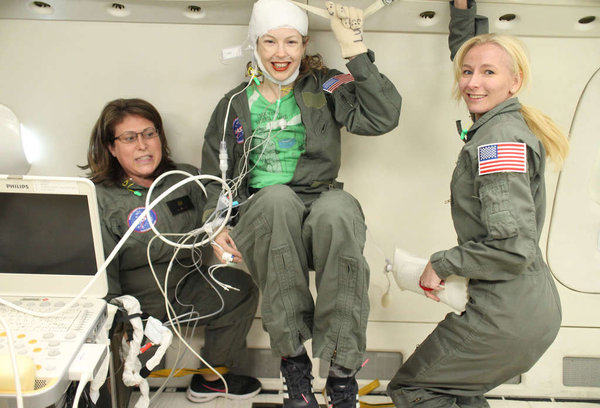Cardiovascular Alterations Team
 Space exploration missions can have deleterious effects on the cardiovascular system. Conversely, astronauts on long-duration missions who have pre-existing, but undetected, cardiovascular disease are at risk for life- and mission-threatening complications when they are far from medical help. The Cardiovascular Alterations Team is determining the effect of long-duration spaceflight on the heart and blood vessels and researching ways to reduce the risks and improve pre-flight detection and management of cardiovascular diseases. The Team works closely with colleagues in flight medicine at NASA Johnson Space Center to develop screening programs for astronauts and to limit the risk of developing cardiovascular events during a long-duration mission.
Space exploration missions can have deleterious effects on the cardiovascular system. Conversely, astronauts on long-duration missions who have pre-existing, but undetected, cardiovascular disease are at risk for life- and mission-threatening complications when they are far from medical help. The Cardiovascular Alterations Team is determining the effect of long-duration spaceflight on the heart and blood vessels and researching ways to reduce the risks and improve pre-flight detection and management of cardiovascular diseases. The Team works closely with colleagues in flight medicine at NASA Johnson Space Center to develop screening programs for astronauts and to limit the risk of developing cardiovascular events during a long-duration mission.
The Team has a number of active areas of research, which include quantifying the risk of coronary events associated with changes in coronary artery calcium scores and determining whether high levels of fitness or use of cholesterol-lowering medication can influence this risk. Researchers are especially concerned about whether space radiation affects endothelial cells, the lining of blood vessels, which might initiate or accelerate coronary heart disease. They are simultaneously examining the efficacy of countermeasures, such as strong anti-oxidants, to ameliorate the effects of radiation exposure on the blood vessels.
The Team is also using novel ultrasound techniques to assess changes in cardiac size, shape and function over the course of prolonged spaceflight on the ISS. Because the heart seems to shrink and reduce its ability to fill completely in space, activities such as exercise or maintain temperature control may be compromised. Therefore, the Team also is determining whether spaceflight impairs temperature regulation in the body.
Leaders
Team Leader:
Benjamin D. Levine, M.D.
University of Texas Southwestern Medical Center at Dallas
Associate Team Leader:
Jay C. Buckey, Jr, M.D.
Dartmouth Medical School, Dartmouth College
Impact in Space
The Cardiovascular Alterations Team is focusing on countermeasures to ensure that potential changes in cardiovascular function do not interfere with crew performance or mission success.
The anticipated deliverables for spaceflight include:
- Acquisition of information that is essential to make decisions regarding astronaut selection for space exploration that will allow flight surgeons to minimize the risk for catastrophic cardiovascular events;
- An optimal strategy of cardiovascular screening to reduce the risk of flying astronauts with pre-existing, but subclinical, heart diseases that could become manifest during an exploration mission;
- New methods to extract physiological data on strain and torsion of the heart from space station echocardiography;
- A comprehensive view of the heart in space derived from spaceflight-obtained data;
- Improved safety (heat tolerance) and physical work capacity of astronauts during extravehicular activities;
- Countermeasures to lessen the adverse effects of radiation-related damage to the endothelial cells which are the lining of the blood vessels and the heart; and
- Determination of whether long-duration spaceflight leads to clinically significant changes in cardiac and vascular structure and function.
Impact on Earth
The Cardiovascular Alternations Team’s work benefits health care on Earth in the following ways:
- Improved ability to detect patients at high risk for catastrophic cardiovascular events and the development of strategies for reducing this risk will have widespread implications for public health and cardiovascular risk reduction in the population at large, especially for asymptomatic individuals;
- Countermeasures for radiation-induced damage to the heart and blood vessels could be used prevent or reduce biological damage from terrestrial radiation sources, such as nuclear weapons or radiation bioterrorism, and to reduce side effects from cancer radiation treatments and solar flares;
- Novel ultrasound techniques developed for analysis of space data can and have been used to evaluate patients with heart disease on Earth; and
- Strength training and rowing are now incorporated into treatment for patients after prolonged periods of bed rest or chronic reduction in physical activity. For example, young women with Postural Orthostatic Tachycardia Syndrome, a disabling syndrome which prevents patients from standing upright for prolonged periods of time, have been effectively cured by using an NSBRI training program developed to prevent cardiovascular deconditioning during bed rest and spaceflight. Other patient groups could benefit from this unique combination of semi-recumbent endurance exercise combined with strength training. These groups include patients with disease processes that alter cardiac stiffness, such as obesity, hypertension, heart failure (especially diastolic heart failure) or ischemic heart disease, and persons with normal aging and osteoporosis.






